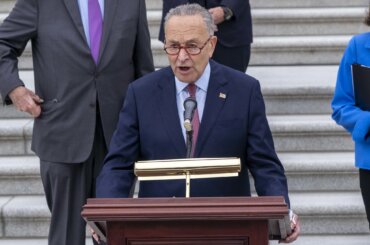Key excerpts from Connie Bruck’s profile of Democratic moneybags Haim Saban in the New Yorker. I do wonder (not having read the piece; this is social media; a trusted friend sent me the excerpt) whether Bruck slighted the Israel lobby angle, as she did in her profile of Saban’s Republican doppelganger Sheldon Adelson. Remember that Bruck is herself married to a stalwart in the lobby, former California congressman Mel Levine who as I recall was courting Saban for Obama 2 years back.
At a conference last fall in Israel, Saban described his formula. His “three ways to be influential in American politics,” he said, were: make donations to political parties, establish think tanks, and control media outlets. In 2002, he contributed seven million dollars toward the cost of a new building for the Democratic National Committee—one of the largest known donations ever made to an American political party. That year, he also founded the Saban Center for Middle East Policy at the Brookings Institution, in Washington, D.C. He considered buying The New Republic, but decided it wasn’t for him. He also tried to buy Time and Newsweek, but neither was available. He and his private-equity partners acquired Univision in 2007, and he has made repeated bids for the Los Angeles Times.
In targeting media properties, Saban frankly acknowledges his political agenda. He has tried repeatedly to buy the Los Angeles Times, because, he said, “I thought it was time that it turn from a pro-Palestinian paper into a balanced paper.” He went on, “During the period of the second intifada, Jews were being killed every day over there, and this paper was publishing images of a Palestinian woman sitting with her dead child, and, on the Israeli side, a destroyed house. I got sick of it.” Saban said he tried to buy the paper in 2007 but lost to Sam Zell, who purchased the Tribune Company, including the L.A. Times. In early 2008, he says that he tried to buy the paper from Zell but that Zell wanted more than he was willing to pay. After the Tribune Company went into bankruptcy, in 2009, Saban said he informed the creditors of his interest. “They’re not going to do anything until they get out of bankruptcy. So am I still interested in the L.A. Times? I am, yeah, I am,” he said. Saban also said that he asked the New York investor Steven Rattner to let the Sulzbergers know that he would like to buy the New York Times, but Rattner told him they weren’t interested. “What’s it worth now, the whole thing—a billion dollars?” Saban said dismissively. “But it’s a family legacy or something, I don’t know.” If the Sulzbergers were to change their minds, he said, “I would be jumping all over it.”
As Saban has said, “I’m a one-issue guy, and my issue is Israel.”
For example, Saban continued, “Obama was asked the same question Hillary was asked—‘If Iran nukes Israel, what would be your reaction?’ Hillary said, ‘We will obliterate them.’ We . . . will . . . obliterate . . . them. Four words, it’s simple to understand. Obama said only three words. He would ‘take appropriate action.’ I don’t know what that means. A rogue state that is supporting killing our men and women in Iraq; that is a supporter of Hezbollah, which killed more Americans than any other terrorist organization; that is a supporter of Hamas, which shot twelve thousand rockets at Israel—that rogue state nukes a member of the United Nations, and we’re going to ‘take appropriate action’! ” His voice grew louder. “I need to understand what that means. So I had a list of questions like that. And Chicago”—Obama campaign headquarters—“could not organize that meeting. ‘Schedule, heavy schedule.’ I was ready and willing to be helpful, but ‘helpful’ is not to write a check for two thousand three hundred dollars. It’s to raise millions, which I am fully capable of doing. But Chicago wasn’t able to deliver the meeting, so I couldn’t get on board.”

